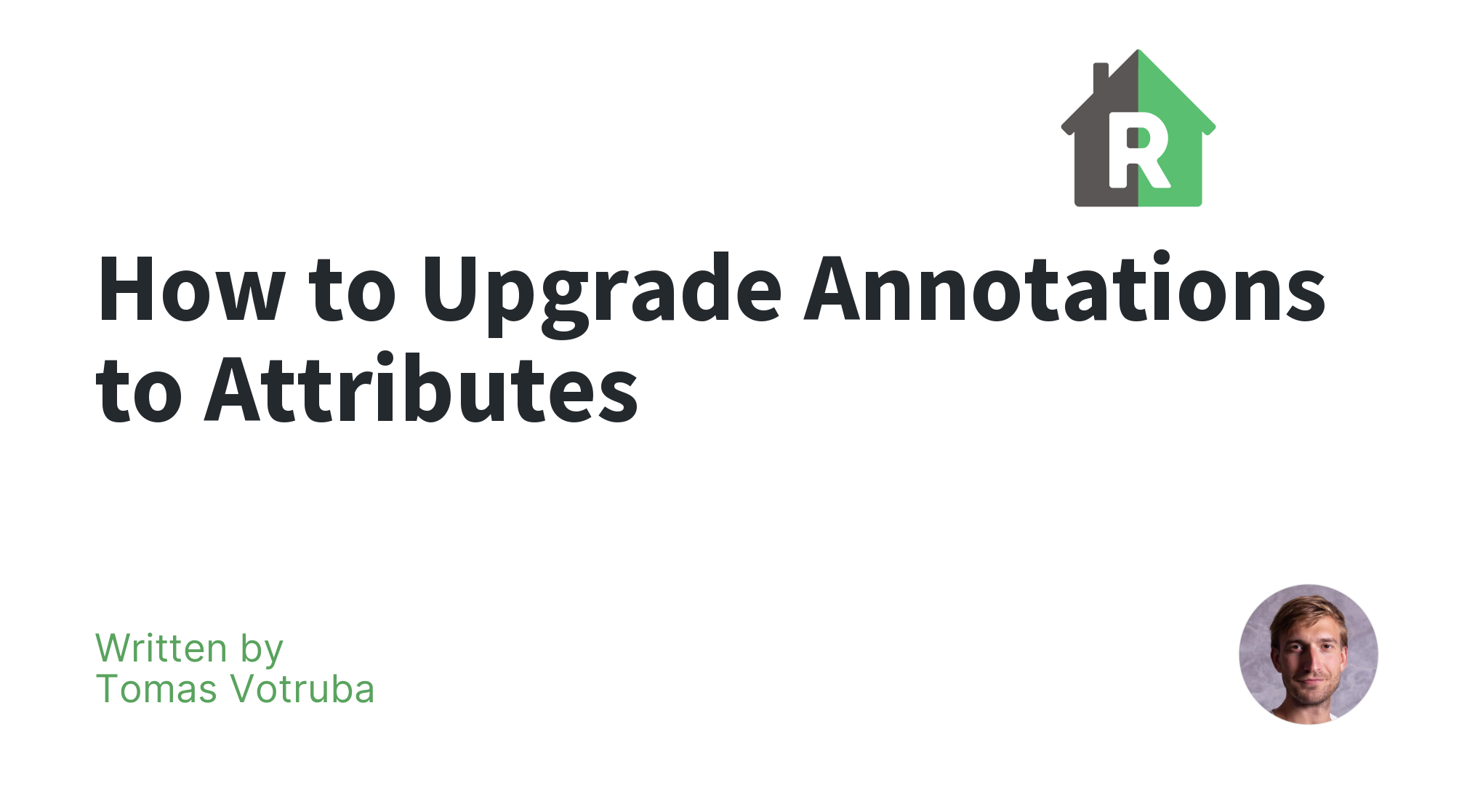getrector.com/blog/how-to-upgrade-annotations-to-attributes
Preview meta tags from the getrector.com website.
Linked Hostnames
6- 9 links togetrector.com
- 3 links togithub.com
- 1 link tostackoverflow.com
- 1 link totwitter.com
- 1 link towww.linkedin.com
- 1 link towww.reddit.com
Thumbnail

Search Engine Appearance
https://getrector.com/blog/how-to-upgrade-annotations-to-attributes
Rector - Automated Way to Instantly Upgrade and Refactor any PHP code
Rector - Automated Way to Instantly Upgrade and Refactor any PHP code
Bing
Rector - Automated Way to Instantly Upgrade and Refactor any PHP code
https://getrector.com/blog/how-to-upgrade-annotations-to-attributes
Rector - Automated Way to Instantly Upgrade and Refactor any PHP code
DuckDuckGo
Rector - Automated Way to Instantly Upgrade and Refactor any PHP code
Rector - Automated Way to Instantly Upgrade and Refactor any PHP code
General Meta Tags
7- titleRector - Automated Way to Instantly Upgrade and Refactor any PHP code
- charsetUTF-8
- X-UA-CompatibleIE=edge
- viewportwidth=device-width, initial-scale=1
- descriptionRector - Automated Way to Instantly Upgrade and Refactor any PHP code
Open Graph Meta Tags
6- og:titleRector - Automated Way to Instantly Upgrade and Refactor any PHP code
- og:titleHow to Upgrade Annotations to Attributes
- og:descriptionWe used `@annotations` in PHP 7.4 and below. Now we can use native `#[attributes]` in PHP 8. They have better support in PHPStan and Rector, thanks to their native language nature. The Internet is full of questions ["How can I use PHP 8 attributes instead of annotations in Doctrine?"](https://stackoverflow.com/questions/66769981/how-can-i-use-php8-attributes-instead-of-annotations-in-doctrine) or ["Converting Annotations to Attributes"](https://www.reddit.com/r/symfony/comments/lbvmdx/converting_annotations_into_attributes/). Do you want to know the answer? Rector has a simple solution for you.
- og:typearticle
- og:imagehttps://getrector.com/thumbnail/how%20to%20upgrade%20annotations%20to%20attributes.png?v=3
Twitter Meta Tags
6- twitter:cardsummary_large_image
- twitter:titleHow to Upgrade Annotations to Attributes
- twitter:imagehttps://getrector.com/thumbnail/how%20to%20upgrade%20annotations%20to%20attributes.png?v=3
- twitter:descriptionWe used `@annotations` in PHP 7.4 and below. Now we can use native `#[attributes]` in PHP 8. They have better support in PHPStan and Rector, thanks to their native language nature. The Internet is full of questions ["How can I use PHP 8 attributes instead of annotations in Doctrine?"](https://stackoverflow.com/questions/66769981/how-can-i-use-php8-attributes-instead-of-annotations-in-doctrine) or ["Converting Annotations to Attributes"](https://www.reddit.com/r/symfony/comments/lbvmdx/converting_annotations_into_attributes/). Do you want to know the answer? Rector has a simple solution for you.
- twitter:site@rectorphp
Link Tags
16- alternate/rss.xml
- apple-touch-icon/assets/images/favicon/apple-touch-icon.png
- icon/assets/images/favicon/favicon-32x32.png
- icon/assets/images/favicon/favicon-16x16.png
- iconhttps://getrector.com/favicon.ico
Links
16- http://github.com/rectorphp/rector
- https://getrector.com
- https://getrector.com/ast
- https://getrector.com/blog
- https://getrector.com/contact